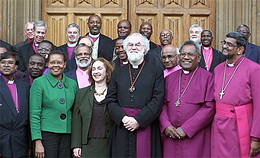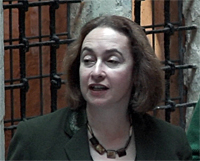Launch of Lambeth Conference 2008
 Archbishop, Jane Williams, Margaret Sentamu and Bishops
Archbishop, Jane Williams, Margaret Sentamu and BishopsMonday 21st January 2008
The Archbishop of Canterbury, Dr Rowan Williams launched the official programme for the Lambeth Conference 2008: Equipping Bishops for Mission, at Lambeth Palace.Joining Dr Williams on the panel were Archbishop Ellison Pogo (Archbishop of Melanesia and Chairman of the Design Group) and Archbishop Ian Ernest (Archbishop of the Province of the Indian Ocean). Mrs Jane Williams outlined the plans for the Spouses' Conference which is being held alongside the bishops' conference. Jane Williams was joined by Margaret Sentamu. 30 bishops from 17 provinces around the Anglican Communion also joined the press conference.
Transcript of the Archbishop's Remarks
I'd like to start by putting this year's Lambeth Conference in some kind of context by saying a brief word or two about how it got started. The first Lambeth Conference was called by Archbishop Charles Longley in 1867 – partly, as it happens, in response to a crisis about the limits of diversity allowed in the Anglican churches around the world; so there's nothing so very new about a Lambeth Conference meeting in a climate of some controversy. But the important new fact about the Anglican family of churches at that point was that it was a time when non-English and indeed non-white influences were for the first time making a real impact in the Communion, and needed to be celebrated and affirmed. Not only did the Canadian Church contribute strongly to the thinking around the Conference; it was also attended by the first black Anglican bishop, Samuel Crowther from Nigeria, who had been made a bishop just three years earlier. It was a moment when there was a real acknowledgement that a worldwide Church had to find ways of sharing its challenges and its triumphs – and some aspects of its decision-making.
The Conference has never been a lawmaking body in the strict sense and it wasn't designed to be one: every local Anglican province around the world has its own independent system of church law and there is no supreme court. But there was already in 1867 a deep concern to find ways short of passing formal laws that would make sure that Anglicans around the world acted in a responsible way towards each other and stayed faithful to the common inheritance of biblical and doctrinal faith. This is as much a challenge now as it was then. But the very fact of the Conference shows that we have always been willing to look for such ways of setting our common life on a firm basis so that we can act and serve more effectively in our world.
The Conference this year has two key points of focus: strengthening the sense of a shared Anglican identity among the bishops from around the world, and helping to equip bishops for the role they increasingly have as leaders in mission, involved in a whole variety of ways in helping the Church grow. Because none of this would happen without a deeper commitment to prayer and studying the Bible, this year's Conference will begin with a couple of days' retreat, in which we can spend time together in quiet and begin to direct our minds towards the central issues of faith. And as in previous Conferences, every day will begin with worship and Bible study in small groups.
We've been exceptionally lucky in the gifts and the vision of the Design Group for this year's Conference. Drawn from a wide range of backgrounds, they have come together in a remarkable way to create not only a programme of events – about which we can speak in more detail later – but a whole way of doing business. In contrast to previous Conferences, we have planned a larger number of medium-sized groups instead of larger issue-focused groups, so that more people can have a say in the discussion. We've called these 'indaba' groups, picking up an African word for meetings where significant questions are worked through in a community.
In spite of the painful controversies which have clouded the life of the Communion for the last few years, there remains, as many people have repeatedly said, a very strong loyalty to each other and a desire to stay together. The fact that about 70% of bishops worldwide have already formally registered for the Conference, with a number of others who have signalled that they will attend, shows something of this desire. But it is also reflected in the life of so many Anglican organisations that continue to work across national and regional boundaries – the Mothers' Union, the enormous variety of church-based development projects dealing with HIV/AIDS or educational matters, the partnership relations between bishops and dioceses from different parts of the globe – the relationship, for example, between my own diocese of Canterbury and the church in Madagascar, or between Salisbury diocese and the Sudanese province. These close and personal relationships, which are not often in the headlines because they simply carry on doing the work they set out to do, are part of the solid ground that helps us cope with the turbulence in other areas. The programme of pre-Lambeth hospitality which is being offered by local churches here in the UK will help to consolidate these relationships for the future, in ways that will respect the integrity of all.
In short, I believe we have, thanks to the hard work of our Design Group and Sue Parkes, our Conference Manager, an unusually varied and original programme – details of which are in your press packs - and a fresh style of working which will allow us both to confront differences honestly and to be focused anew on our primary tasks of service and mission. It is with real confidence that I introduce the work of this year's Lambeth Conference to you, with enormous thanks to all who have laboured in organising it; I know its vision is supported by the prayers of many people in our Communion, and I hope many more will go on holding it in their thoughts and prayers in the coming months.
© Rowan Williams 2008
Transcript of Jane Williams's Remarks
 Some of you may think of the Spouses conference as basically Jam and Jerusalem, more tea vicar or mitre-making and flower-arranging. There will certainly be food and singing in our programme, but there will also be a chance to meet some of the most interesting, committed and dynamic people in the Anglican Communion.
Some of you may think of the Spouses conference as basically Jam and Jerusalem, more tea vicar or mitre-making and flower-arranging. There will certainly be food and singing in our programme, but there will also be a chance to meet some of the most interesting, committed and dynamic people in the Anglican Communion.
Bishops' spouses are as varied as the spouses of people in any other profession would be, but we do have some things in common: like our faith, and the pains and pleasures of living with and supporting a bishop!
Our planning group for the Spouses Conference has been a real privilege. I have learned a bit of what it's like to live through drought, floods and elections in part of Australia, or to run micro-finance projects in Africa. Our sister from Myanmar was amazed to find that we knew far more about the troubles in her country than she did. This kind of family knowledge we have about each other across the Anglican Church is what builds our advocacy for each other, our prayer for each other, and our action for each other.
So our two main aims in the Spouses Conference are to learn from each other and to resource ourselves to be God's People for God's Mission.
In lots of Anglican provinces, spouses can hardly meet at all, because of distances and lack of resources, and while all bishops get some kind of training and resourcing for their role, their spouses may not. And for many of the people coming, this is the only break they will get in 2008, and for some of them, their only opportunity to travel outside their own country, ever. So we want to make the most of what will, for most of us, be a once in a lifetime chance to equip ourselves, in the company of others who really know what we need. Our programme gives time for quite a lot of telling our stories and learning how to listen to each other. In my own experience, this is where the reality of the 'Anglican Communion' comes alive, in hearing the diversity, richness, challenges and successes of other Christians around the world.
We also plan to make something together, which will symbolise our connectedness, and that communicates without words our variety and our unity. I think Margaret is going to tell us a bit more about that shortly.
We plan to look at some of the huge issues that face us all, and that diminish God's people and make it harder for others to hear God's good news. For example, the effects of ecological change, the challenge of health care projects, or the way in which gender violence affects our communities. For some of these themes, we will be joining the Bishops' Conference, because these are not 'women's issues'. The whole people of God need to be challenged and have their needs heard and ministered to in these areas.
I hope it will become clear why I am proud to belong to this extraordinary company of Bishops' spouses; I hope you will see just how varied the mission and ministry of the Anglican Communion is; and I hope we will go home at the end of Lambeth 2008, knowing that we have friends across the world on whom we can rely in good times and bad.
© Jane Williams 2008
